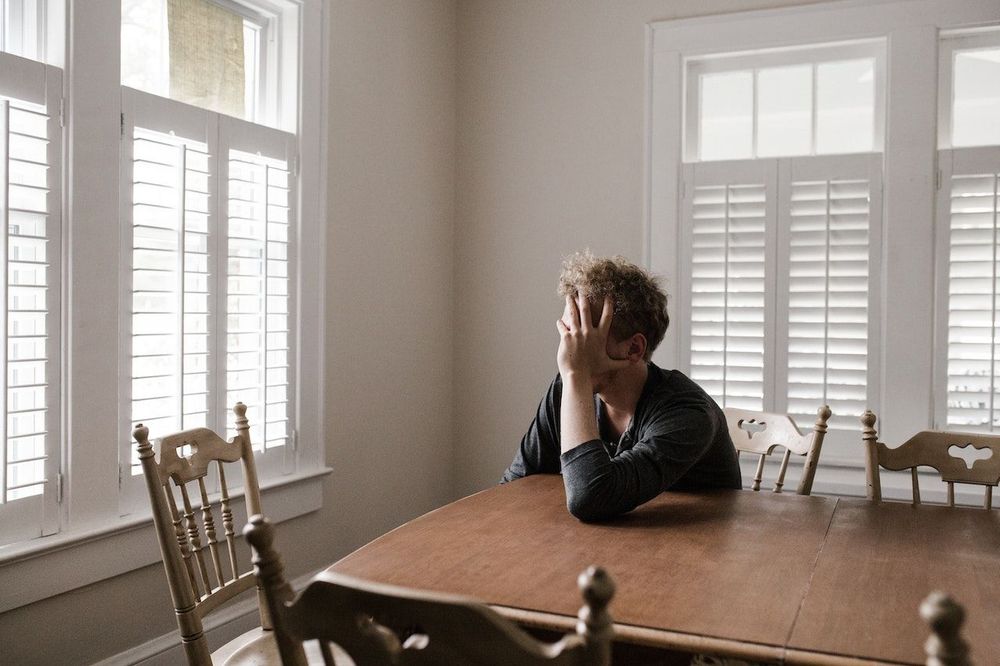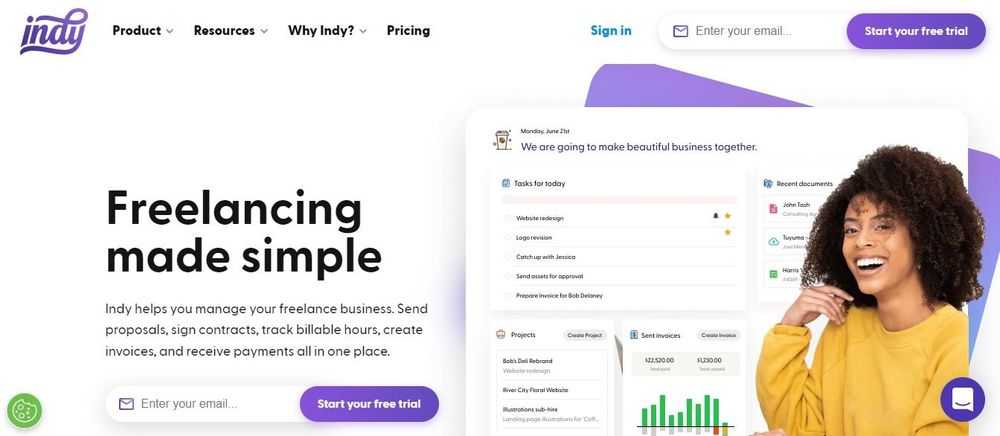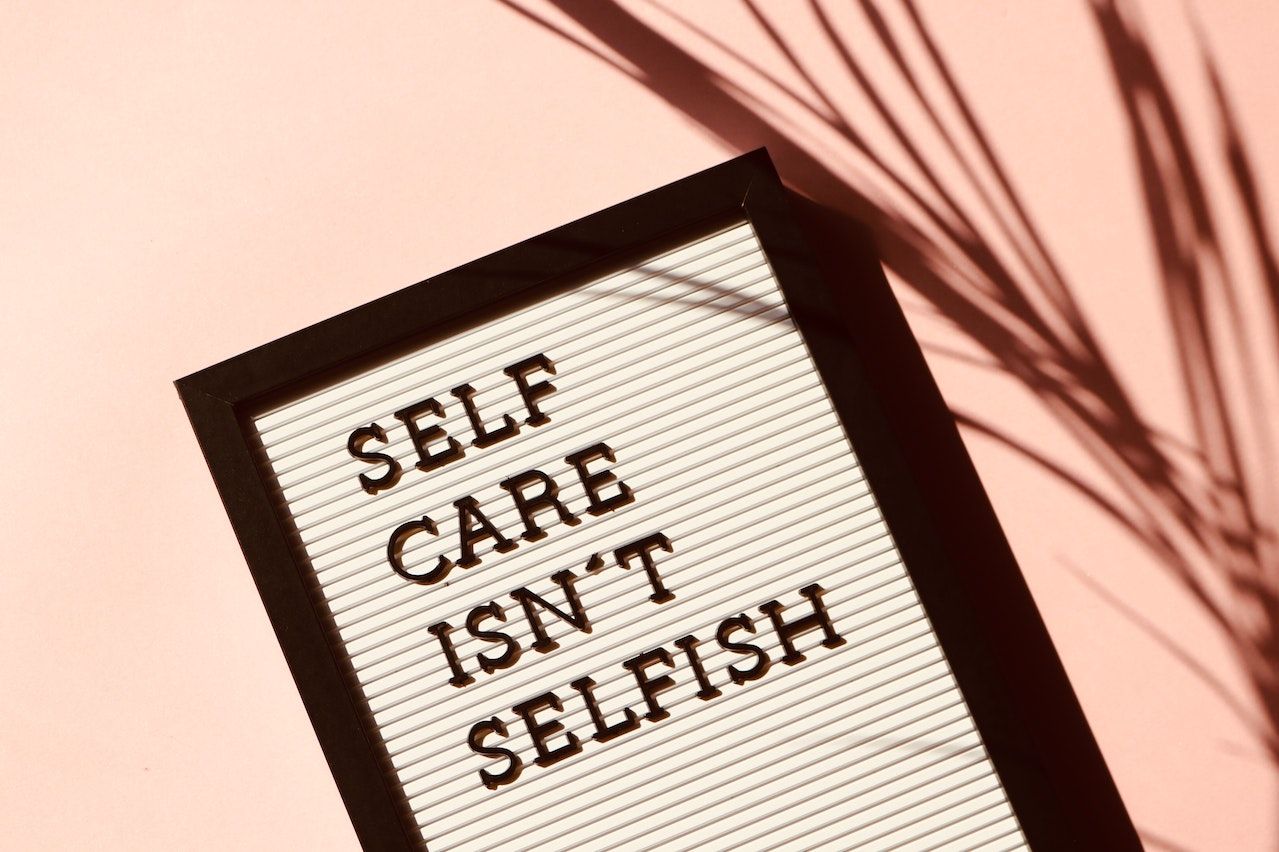For many freelancers and remote workers, getting rid of commuting, abandoning the cubicle, and gaining a unique sense of autonomy has been an incredibly positive change. However, if you are thinking of starting a solo career (or you've been doing it for a while), you should be aware of some of the downsides of handling your own schedule; for you have independence, yes, but you now also need to juggle multiple projects at the same time and work with quick deadlines—usually entirely on your own.
Freelancers get burnout, so it's essential to identify the early signs and ensure you're dealing with them appropriately. In this lesson, we will explore the risks to your mental health while working as a freelancer or small business owner, how to find a better work-life balance and set healthy boundaries, a few notes on health insurance, and what to do if you think you might be struggling with mental illness at work.
What is mental health, and why does it matter for a freelance business?
Let's start with a definition. What are we talking about when we mention mental health? The concept includes a few different aspects of our personality and life; for example, our physiological, emotional, and social well-being. Mental health affects how we handle stress, how we feel and think, and how we act toward others and ourselves; the reason why it's so important at every stage of our lives.

Different types of mental health issues
According to experts, there are several types of mental illness or mental disorders. The most common ones include:
- Mood disorders: They involve persistent feelings of sadness or fluctuations between extreme happiness and extreme sadness. Depression, cyclothymic disorder, and bipolar disorder are all in this category.
- Anxiety disorders: They have to do with how a person responds to particular objects or situations, typically by feeling fear and experiencing rapid heartbeat and sweating, in what's considered an inappropriate way (for example, by not being able to control the response and having it interfere with normal functioning).
- Psychotic disorders: These disorders involve distorted thinking and awareness, such as hallucinations and delusions. For instance, schizophrenia is a psychotic disorder.
- Eating disorders: They involve extreme behaviors, emotions, and attitudes towards food and weight. For example, anorexia or binge eating disorder.
- Obsessive-compulsive disorder (OCD): Those experiencing OCD suffer constant thoughts or fears that push them to perform certain routines or rituals.
- Post-traumatic stress disorder (PTSD): A condition that develops after a traumatic event, producing long-lasting and frightening memories and thoughts around it.
- Addition and impulse control disorders: People who suffer from them cannot resist impulses and urges to perform harmful acts. For example, kleptomania (stealing), pyromania (starting fires), or compulsive gambling.
- Personality disorders: These disorders are more extreme and inflexible and have to do with patterns of thinking and behavior. Some common ones include paranoid personality disorder, antisocial personality disorder, and histrionic personality disorder.
Other less common mental health challenges include stress response syndromes (when a person develops symptoms in response to a stressful situation), dissociative disorders (when someone suffers from severe changes in memory, identity, and awareness of themselves and what's around them), and somatic symptom disorders (when you experience physical symptoms of pain or illness that might or might not have a medical cause).
Mental health and freelancing
Most freelancers report that, after changing to self-employment, they experienced a somewhat positive change, with one crucial caveat: Younger people were more likely to actually see the transition as negative (16% compared to 5% for over-32).
Unfortunately, many people find freelancing more challenging than they had initially anticipated; in large part, it seems due to financial worries, but there's more to the issue. So, let's deep dive into mental health in freelancing and the self-employed to see if we can understand what's behind some of these issues to remove the stigma and find proper care.
Why do freelancers and the self-employed have mental health issues?
Some of the challenges many small business owners and freelancers experience have to do with the blurring of work and home life, the irregular income, and the difficulties in finding new employment. Other external factors (such as the latest pandemic) can make things even more stressful, with people reporting their productivity is dropping, and they are experiencing mental illness through issues like anxiety, depression, and insomnia.
Common freelancer mental health concerns and problems
As a freelancer, you know you are in complete charge of managing your time. You're probably thick-skinned, resilient, hardworking, and know your strengths. But the deadlines loom, and the clients all have various requirements that seem to filter into your personal life. Perhaps it's time to look at what's happening and see whether your mental load is taking a toll on your health.
Stress, anxiety, depression, and burnout are all relatively common ailments for freelancers. Then, there's isolation and loneliness, especially when working remotely. We love independence, but with it comes the need to find our own motivation, identify clients, constantly learn new skills, and adapt to a forever-changing market. It's no surprise, then, that you are having trouble finding a good work-life balance.

How to recognize mental health problems (and what to do if you find them)
Here are some things to watch out for if you suspect you might be facing mental health issues:
- Losing interest in things you used to love: This could be your job or something else you enjoyed. If it is taking too long to do because you simply cannot find it interesting, this could be a red flag and the perfect opportunity to check your mental health.
- Isolating yourself from others: If you don't want to talk to other freelancers, friends, or family, this could be an early sign of depression or SAD (Seasonal Affective Disorder, more prominent in fall and winter).
- Shutting down and acting out: Mood disorders can affect the way you communicate with others and cause you to react in unexpected ways.
A study identified more specific symptoms of mental health stressors. These include:
- Sleep disturbances: Are you sleeping less than before, have trouble waking up, or your sleep quality has just become poorer?
- Inability to relax: Do you feel you simply cannot disconnect or enjoy things anymore? Are you unable to stop thinking about work?
- Presenteeism: Do you keep working even if you don't feel well? Are you not taking enough breaks?
- Unhealthy habits: Are you over or under-eating? Exercising too much or too little? Consuming too much caffeine?
How to prevent mental health issues as a freelancer
Most of us doing freelance work feel we can do anything. But this mentality, which can drive us to succeed, also comes at a cost. So, what can we do to keep anxiety and depression under control?
First, identify what's stressing you out.
It's unlikely you're feeling stressed just because of one issue, but you can still determine your leading causes of concern so you can recognize the problems and see if there's something you can change.

For instance, here are some everyday stressors you have to deal with as a freelancer:
- Your clients are setting unrealistic deadlines
- The scope of a project keeps growing without pause
- Your clients are not communicating with you or paying you on time
- Your contractors are not finishing their tasks when they should
- You cannot get around that contract filled with legalese
The specific ways in which you can address these issues will depend largely on your business, but if you can identify the problem, you will be one step closer to finding a solution.
Then, take back control.
You became a freelancer, probably, because you wanted to have control over your time and tasks. However, this can become quite a tricky thing once you get carried away by the various projects, clients, and requirements you need to face on a daily basis. So, the second best thing you can do (after identifying your stressors) is to see where your time is going and whether you need to adjust your workload.
For example, here are some things that might be happening:
- Your client portfolio is too large
- You're not assigning enough hours to certain tasks
- Your most productive hours are spent doing something else
Once you know where your time is going, you can start making changes.
And... learn to say no.
Setting expectations is something you get better at doing as you advance your career, but for some of us, saying no is still challenging. It's best if you learn how to manage expectations but also master the art of saying no. For instance:
- Don’t work on requests that have unrealistic deadlines and/or add emergency premiums
- Make it very clear when you are available (and when you are not)
- Tell clients they might have to wait while you're busy with other projects
Many freelancers are scared of losing potential clients, so they accept jobs even when they know they will struggle to deliver them. Not everyone will want to work with you, and that's fine (they probably wouldn't have valued your work anyway, so it's best to be patient and wait for the client that will). Lastly, it’s always a good idea to figure out what things you can outsource to others and learn how to delegate tasks.
Tips for taking care of your mental health
We've covered some tips for preventing work from feeling too overwhelming. Of course, there's more to tackling mental health at work than understanding your stressors, setting up boundaries, and learning how to say no. So, let's now go through some proactive things you can do to reinforce good habits—and explore a few resources when you need to ask for a little more help.
Take care of your body and mind
You probably know this tip, but it's one thing to understand what your body and mind need and another to actually change your habits.
The best ways in which you can take care of yourself are by getting enough rest, sleeping well, and doing regular exercise. Sleep deprivation correlates directly with poor mental health, as a sleepless night can leave you irritable and vulnerable to stress. So, first and foremost: Sleep!

It's normal for any of us to crave junk food after (or during!) a hard day's work. However, this is a terrible idea in the long term, as an unhealthy diet will only make you feel more tired and impact your overall well-being. You can recharge your batteries by getting some exercise and enjoying a little relaxation, even if it's going for a short walk or ride. Take breaks regularly, and remember: You deserve a holiday, too!
Talk to other freelancers (and friends)
If you spend most of the day at home, you'll likely start feeling isolated and lonely at some point. It can be a great idea to join a community where you can share your concerns with other people who are also facing similar challenges. This will help you see that, firstly, you are not the only one experiencing stress and, secondly, that there are proven tricks you can use to deal with burnout, isolation, and sadness as a freelancer.
Reaching out to other people can have a positive impact even if they don't share your way of working, but connecting with other independent professionals can definitely provide you with a powerful outlet to express your frustrations and get advice. Of course, reaching out to friends and family members (or rather, maintaining your interaction with them) can help you keep a positive attitude toward life.

Separate your living space and workspace
For a freelance business, the separation between your living space and your workspace can be a little tricky. If you don't set up some boundaries, though, you could be at risk of carrying your work-related stress into your private life.
Whenever possible, try to allocate a space that you only use for work and only spend time in it during your working hours. This will give you a nice sense of consistency and order and help you manage stress—particularly once you leave that space.
A good alternative to always working from home is to use a co-working space, at least for a few hours a week. Most of them have affordable prices and come with extra perks, such as networking events, meeting rooms, and call booths.
Pick the best tools that can make things easier
There are several platforms and apps designed to simplify freelance life. If you are self-employed and/or run your own business, consider signing up for a one-stop-shop that can help you save time and money—and manage your workload more efficiently.

Indy is a single-subscription platform that comes with all the tools you will need to run a successful freelance business. For example, Indy has contract, invoice, and proposal templates, a handy task manager, calendars, time trackers, forms, and file sharing. It also has lightweight CRM capabilities and various powerful integrations that can help you deal with multiple projects, all from the same location.
You can access Indy’s core tools with a free plan and, when you're ready for more empowerment, upgrade to Indy Pro for automated workflows and integrations with your other favorite apps.
Reach out to a professional
There might come a time when you might feel you have little control over your mental well-being. There's nothing to be ashamed of; we all struggle with mental health and need a little tuning once in a while, especially taking mental health breaks. If you feel this is your case, too, it's a good idea to ask for a little extra help from a professional.
If you are a freelancer, your insurance might not cover a physiatric doctor, but you can chat with a therapist or a psychiatrist nurse, which are less expensive options. A trained counselor can help you navigate the hard times and give you tools to make it as a (happy) freelancer.
If you are thinking about harming yourself or someone else, go to the nearest hospital (ideally one that has a psychiatric emergency room), so they can monitor the severity of your case. You can also call the suicide hotline or text the crisis hotline.
Conclusion
As a freelancer, you need to come to terms with the fact that you won't be able to make time for everything and everyone. Using a tool that makes freelancing simple is helpful, but you should also always prioritize certain activities and tasks and not neglect your connection with others and with yourself.
Freelancing and remote work are tough, and it's a rather new phenomenon. We can anticipate some of the mental health complications it might bring, but we're still learning how to deal with emotional overwhelm. So, if you're not feeling well, don't be afraid to ask for help. We've all been there.



